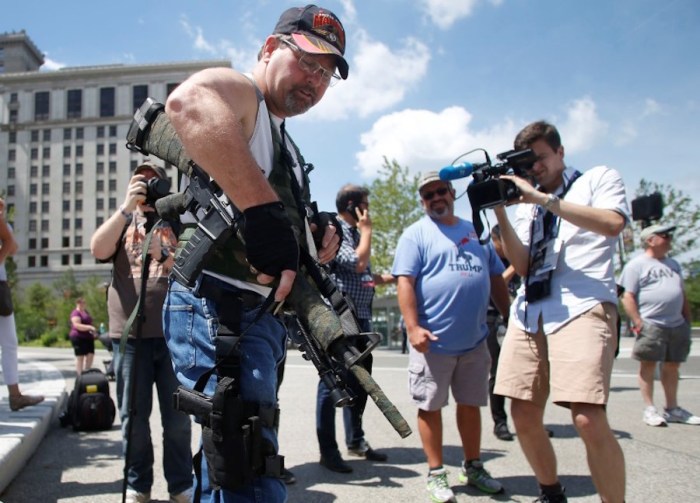‘Chi-Raq’ It’s been a decade since we got a real Spike Lee joint — the kind that pisses off the right people; the kind that speaks loudly and bluntly about societal ills that show no sign of abating; the kind that mixes the political with the humane; the kind that actually gets a wide release. “Chi-Raq” is one of those: an angry, boisterous, timely, hilarious, serious, goofy, necessary, personal salvo. Lee has spent the last 10 years struggling to get work out, struggling to get the money for films that can address what’s going wrong. “Chi-Raq” is just that. It’s so up-to-the-minute about our times, especially black-on-black urban gun violence in Chicago, that it has a great diss on Ben Carson. RELATED: Review: The new “Macbeth” offers (another) bleak take on “The Scottish Play” It’s a satire, and the last time Lee made one of those — 2000’s righteous but flawed “Bamboozled” — he actually opened with the definition of the term. “Chi-Raq” is more sure of itself, even as it has its equivalent of a Greek Chorus (Samuel L. Jackson) announce to us it’s a take on Aristophanes’ Greek play “Lysistrata.” Here, as there, the women of a community engaged in war go on a sex strike. Lysistrata, played with starmaking gusto by “Dear White People”’s Teyonah Parris, is the ladyfriend of a rapper and gang leader (Nick Cannon). Lysistrata’s gotta have it, but she also knows her man might prefer It over engaging in wreckless gunplay with his rival gang lord, played by a never sillier Wesley Snipes in a sparkly red eyepatch. As Lysistrata rounds up the neighborhood women — and eventually females the worldwide — into her “blue ball movement,” Lee crams the film with equal parts jokes and straight-faced, wallowing pleas for peace. One scene will have dick jokes; the next Jennifer Hudson wailing over her seven-year-old daughter, killed by crossfire. (A scene of her silently scrubbing the blood off the street is suitably galling.) Lee, as commentators never tire of pointing out, is messy, but the jostling between tones — broadly funny, often filthy, then devastatingly serious, then back again — makes sense with this topic. The palpable anger needs the levity of sex jokes, just as the sex jokes are built on a foundation of palpable anger. A recent, hugely irresponsible piece in the Chicago Tribune alleged, sight unseen, that “Chi-Raq” would trivialize a tragic part of our nation’s current fabric. The writer obviously had never seen a Spike Lee film before. Lee’s so adamant about spreading awareness that he stops the movie dead so a white pastor (a surprisingly stirring John Cusack) in a black church can launch into a fiery sermon about urban violence, about innocent children being hit by stray bullets, about the blind eye turned to low-income neighborhoods. RELATED: Review: “Creed” shows how to do “Rocky” and fan fiction right And yet “Chi-Raq” is fun, and often very funny. It gives us Dave Chappelle, as a flustered strip joint owner, ranting about how Lysistrata and company want to “shut down the penis power grid.” It gives us Isaiah Whitlock Jr. —the “s—” guy from “The Wire,” who first did his shtick in Lee’s own “25th Hour” and “She Hate Me” —busting out the most epic “s—” yet filmed. It’s a part-time musical, with a killer Chi-Lites number. It has characters speak — though not always — in playful verse, which is studded with references to Michael Brown, Eric Garner, Sandy Hook and the “four little girls” of Birmingham. It’s peppered with references to events that still bleed, as though Lee and his cowriter, Kevin Willmott —of the Spike-esque what-if faux-doc “CSA: Confederate States of America” —were constantly amending the script as new tragedies trickled in during production. “Chi-Raq” is still, despairingly, timey, but its sincerity never lessens its boldness. It manages to seem typical-Spike-messy and focused in its fury and its construction. It keeps moving, building to a utopian conclusion whose far-fetched-ness makes its subject all the more despairing. It has no real solutions, as satires don’t have to. The best ones keep scratching at scabs, keep uncovering ugly ailments that are nowhere near close to being remedied. It has the verve and the huge, theatrical scope of a blockbuster, starting with its overture: a rap song whose brooding lyrics are printed, line by line, on the screen, followed by a Gaspar Noe-red flashing sign reading “THIS IS AN EMERGENCY.” It feels now and timeless, universal and very, very much Spike Lee. Follow Matt Prigge on Twitter @mattprigge
Director: Spike Lee
Stars: Teyonah Parris, Nick Cannon
Rating: R
5 (out of 5) Globes
‘Chi-Raq’ is classic Spike Lee: angry, wild and genuinely important

Roadside Attractions


















